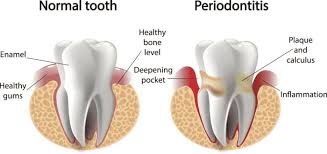Maintaining good oral hygiene is essential for overall health, and one of the biggest threats to oral health is the formation of a calculus bridge. A calculus bridge is the result of hardened plaque, which can accumulate over time if teeth are not cleaned regularly. This build-up not only affects the appearance of your teeth but can lead to serious dental issues like gum disease, tooth decay, and bad breath. Fortunately, with proper oral care, the formation of a it can be prevented. In this article, we’ll explore how adopting better oral care habits can help you avoid this problem.
Understanding What a Calculus Bridge Is
Before discussing preventive measures, it’s essential to understand what a calculus bridge is. Plaque forms on your teeth when bacteria in your mouth mix with sugary and starchy foods. If plaque isn’t removed through daily brushing and flossing, it hardens into calculus, or tartar. Over time, this tartar can extend across multiple teeth, forming a calculus bridge. This bridge-like formation can create numerous problems, including inflammation of the gums, infection, and even bone loss if left untreated. Unlike plaque, which can be removed through regular brushing, calculus can only be removed by a dental professional using specialized tools. That’s why prevention is crucial.
Daily Brushing for Effective Plaque Removal
The cornerstone of preventing it is daily brushing. Dentists recommend brushing your teeth at least twice a day, using a toothbrush with soft bristles and fluoride toothpaste. This helps remove plaque before it hardens into calculus. Be sure to brush for at least two minutes, paying special attention to all tooth surfaces, including the back teeth and gumline. Electric toothbrushes can offer an added advantage as they provide more consistent motion, which may help reduce plaque more effectively than manual brushing. In particular, electric toothbrushes with rotating-oscillating heads can provide deeper cleaning, lowering the risk of plaque turning into calculus.
The Importance of Flossing in Plaque Prevention
While brushing is essential, flossing is equally important for preventing a calculus bridge. Brushing alone cannot reach the spaces between your teeth where plaque tends to accumulate. Flossing helps remove food particles and plaque from these areas, preventing them from hardening into tartar. Flossing at least once a day is recommended, preferably before bedtime. It helps ensure that the areas between your teeth are free from the plaque that can lead to a calculus bridge. If traditional floss is difficult to use, consider alternatives like water flossers, which can be just as effective at cleaning between teeth.
Regular Dental Checkups for Early Detection
Even with the best oral care habits, it’s crucial to see your dentist regularly for professional cleanings and checkups. Dentists have the tools and expertise needed to remove plaque and calculus that may have built up in hard-to-reach areas. They can also detect early signs of a calculus bridge and provide treatment before it becomes a more serious issue. Most dentists recommend visiting at least twice a year for a routine cleaning. However, if you are at higher risk for calculus buildup due to factors like genetics, smoking, or a diet high in sugary foods, you may need more frequent visits.
Adopting a Healthy Diet to Prevent Calculus Formation
Your diet plays a significant role in oral health and can either contribute to or help prevent the formation of a calculus bridge. Foods high in sugars and starches, like candy, bread, and soft drinks, provide the fuel that bacteria need to produce plaque. Over time, frequent consumption of these foods can lead to more plaque buildup and eventually a calculus bridge. On the other hand, eating a diet rich in fruits, vegetables, whole grains, and lean proteins promotes healthier teeth and gums. Foods high in fiber, like apples and carrots, can help scrub teeth clean while chewing. Additionally, drinking plenty of water throughout the day can help wash away food particles and reduce the risk of plaque formation.
Avoiding Smoking and Tobacco Products
Smoking and the use of tobacco products are major risk factors for the formation of a calculus bridge. Tobacco use affects saliva production, making it harder for your mouth to naturally wash away bacteria and food particles. Additionally, smokers tend to have more plaque and tartar buildup, which can quickly lead to gum disease and calculus formation. Quitting smoking is one of the best things you can do for your oral health. Not only does it reduce your risk of developing a calculus bridge, but it also improves gum health, reduces bad breath, and lowers the risk of oral cancer.
Staying Hydrated for Optimal Oral Health
Staying hydrated is essential for maintaining good oral health and preventing the formation of a calculus bridge. Drinking water throughout the day helps keep your mouth moist and promotes the production of saliva, which is your body’s natural defense against plaque. Saliva helps neutralize acids produced by bacteria and washes away food particles, reducing the risk of plaque buildup. In contrast, dehydration can reduce saliva production, allowing plaque to accumulate more easily. Be sure to drink plenty of water, especially after meals, to keep your mouth clean and hydrated.
The Role of Dental Sealants in Preventing Plaque Build-Up
For individuals who are particularly prone to plaque and calculus formation, dental sealants may be a helpful preventive measure. Sealants are thin, protective coatings applied to the chewing surfaces of the back teeth. They create a barrier that prevents food and bacteria from getting trapped in the grooves of the teeth, which are common areas for plaque accumulation. Sealants are often recommended for children and teenagers, but adults at higher risk for plaque buildup may also benefit from this treatment. While sealants do not replace regular brushing and flossing, they can offer an added layer of protection against the formation of a calculus bridge.
Conclusion
Preventing the formation of a calculus bridge requires a consistent and comprehensive oral care routine. By brushing and flossing daily, using mouthwash, maintaining a healthy diet, and staying hydrated, you can reduce the likelihood of plaque building up and hardening into calculus. Regular dental checkups and professional cleanings are also essential for early detection and removal of tartar. With these habits in place, you can protect your teeth and gums, ensuring long-term oral health.






Comments